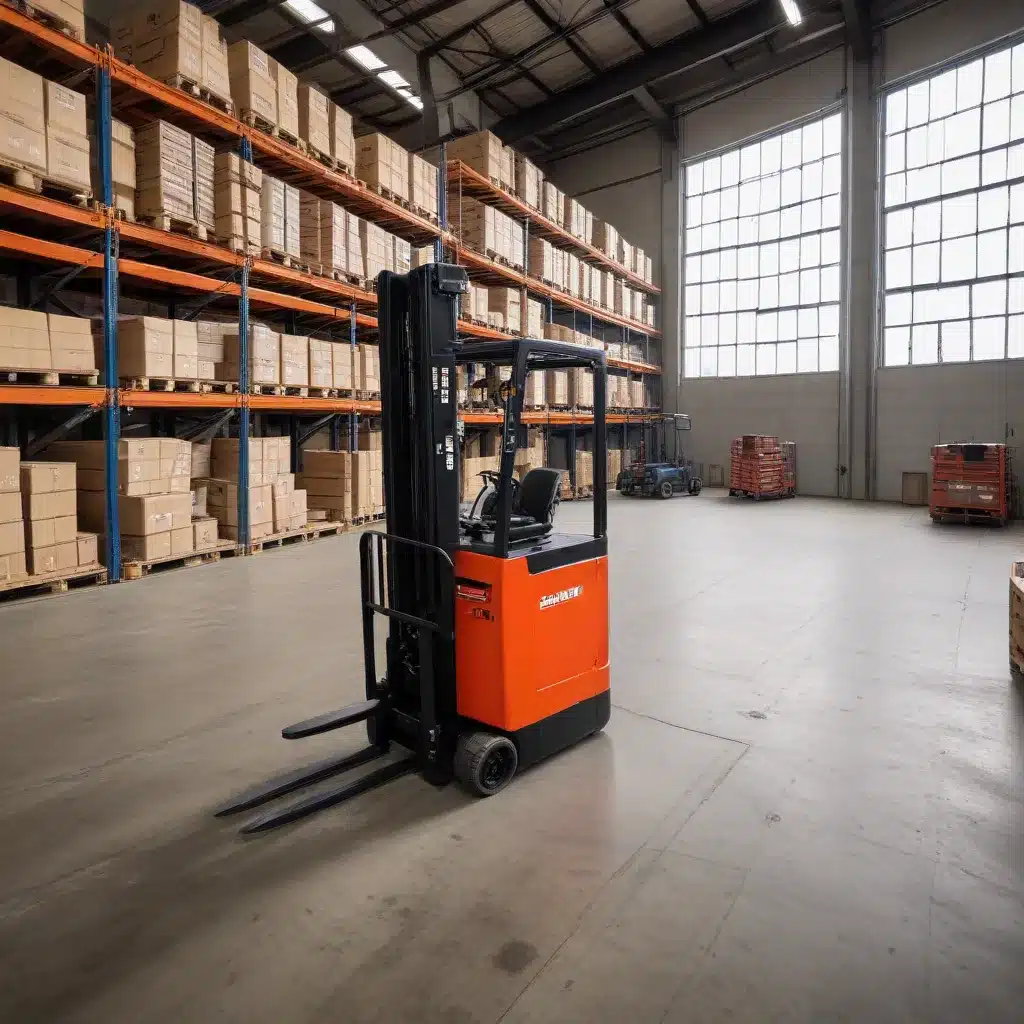
The Shifting Landscape of Warehouse Operations
In the face of rapidly evolving industry demands, warehouses are under immense pressure to adapt and optimize their material handling operations. From labor shortages and surging e-commerce to the call for greater sustainability, warehouse managers are tasked with navigating a complex web of challenges. At the heart of this transformation lies a game-changing solution: the rise of electric forklifts.
Addressing the Labor Crisis
The warehousing industry is grappling with an alarming labor shortage, with annual employee turnover rates hovering around 50%. As the global workforce shortage is expected to reach 85 million people, warehouse managers are seeking innovative ways to enhance productivity and retain skilled operators. Electric forklifts offer a compelling solution, providing a safer and more intuitive operating experience that can help attract and retain talent in this competitive landscape.
Meeting E-commerce Demands
The explosive growth of e-commerce has driven warehouse expansion to unprecedented levels, with urbanization and online shopping fueling the need for greater storage capacity and faster fulfillment. Faced with these demands, warehouse operators must find ways to maximize their existing spaces and streamline their material handling processes. Electric forklifts, with their ability to operate in narrower aisles and enhanced maneuverability, can help warehouses increase storage capacity by up to 50%, optimizing their layouts and boosting overall productivity.
Prioritizing Sustainability
The global shift towards environmental consciousness has placed a newfound emphasis on sustainable practices across industries. Warehouses are no exception, as they strive to reduce their carbon footprint and embrace eco-friendly solutions. Electric forklifts, with their zero emissions and quieter operation, offer a sustainable alternative to traditional diesel or gas-powered models, aligning warehouses with the growing demand for green material handling.
Unlocking the Advantages of Electric Forklifts
As the industry embraces this transformative technology, the benefits of electric forklifts are becoming increasingly clear. From enhanced safety and efficiency to cost savings and environmental impact, these innovative machines are poised to redefine the future of warehouse operations.
Improved Safety and Operator Experience
Safety is paramount in any warehouse environment, and electric forklifts are designed to prioritize the well-being of both operators and the surrounding workforce. These machines are equipped with advanced safety features, such as automatic intervention systems that reinforce best practices in real-time. Additionally, the smoother and more intuitive operation of electric forklifts can help reduce the risk of accidents and create a more comfortable working environment for operators.
Enhanced Efficiency and Productivity
Electric forklifts offer a range of features that can streamline warehouse operations and boost productivity. Their superior maneuverability, ability to operate in narrow aisles, and increased lift capacities can optimize storage utilization and minimize material handling time. Furthermore, the lack of emissions and reduced maintenance requirements of electric forklifts can translate to significant cost savings and higher uptime, further enhancing overall efficiency.
Sustainable and Eco-friendly Operations
As warehouses strive to reduce their environmental impact, electric forklifts provide a sustainable solution that aligns with these goals. These machines produce zero direct emissions, significantly lowering the carbon footprint of warehouse activities. Additionally, the quieter operation of electric forklifts can create a more comfortable working environment, while reducing noise pollution in and around the facility.
Adaptability and Versatility
Electric forklifts are designed to excel in a wide range of warehouse environments, from indoor sensitive spaces to rugged outdoor applications. These machines can be equipped with various attachments and optimized for different lifting capacities, making them a versatile choice for handling a diverse array of materials and loads. Whether it’s managing heavy construction materials or delicate goods, electric forklifts can adapt to the unique needs of various industries.
Navigating the Transition to Electric Forklifts
As warehouses embrace the benefits of electric forklifts, the journey towards sustainable material handling presents both challenges and opportunities. Successful implementation requires a strategic approach, leveraging industry expertise and comprehensive support.
Assessing Infrastructure and Charging Needs
Transitioning to electric forklifts necessitates the evaluation of existing infrastructure and the development of a robust charging strategy. Warehouses must consider factors such as power supply, charging station placement, and battery management to ensure seamless integration and uninterrupted operations. Working closely with industry experts can help warehouse managers navigate this transition and optimize their electrical infrastructure for maximum efficiency.
Investing in Operator Training and Support
Embracing new technologies often requires a shift in operator mindsets and skills. Comprehensive training programs and ongoing support are essential to ensure that warehouse personnel are equipped to handle electric forklifts safely and effectively. By investing in operator education and fostering a culture of continuous learning, warehouses can unlock the full potential of their electric forklift fleets.
Leveraging Industry Expertise and Partnerships
Navigating the complexities of electric forklift selection, integration, and maintenance can be a daunting task. Engaging with industry experts, such as reputable forklift manufacturers and specialized service providers, can be a game-changer. These partners can offer guidance on the latest technologies, assist with performance optimization, and provide reliable maintenance and support services to ensure the longevity and efficiency of electric forklift fleets.
Embracing the Future of Warehouse Sustainability
The rise of electric forklifts represents a transformative shift in the warehousing industry, addressing critical challenges and ushering in a more sustainable future. By leveraging the advantages of these innovative machines, warehouse operators can position themselves for long-term success, enhancing safety, efficiency, and environmental stewardship.
As the industry continues to evolve, embracing electric forklifts is not just a choice but a necessity. Warehouses that proactively invest in this technology will not only future-proof their operations but also contribute to the broader goal of creating a greener, more resilient material handling ecosystem. The future of warehouse sustainability is here, and electric forklifts are leading the charge.
To explore the latest advancements and discover how electric forklifts can elevate your warehouse operations, visit Forklift Reviews. Our team of industry experts is dedicated to providing the insights and guidance you need to make informed decisions and stay ahead of the curve.

